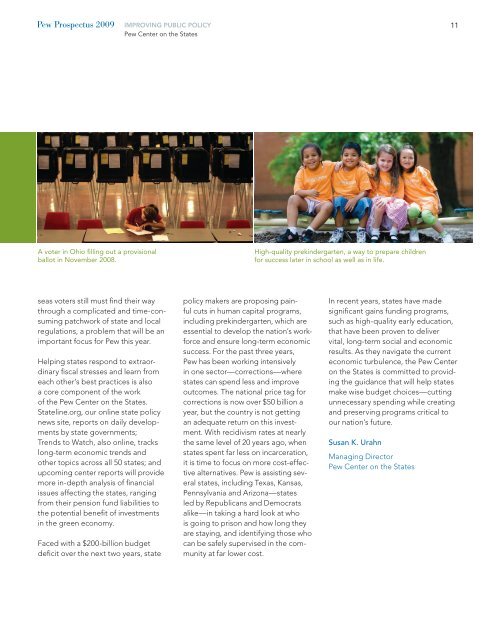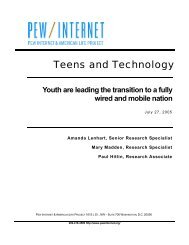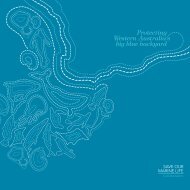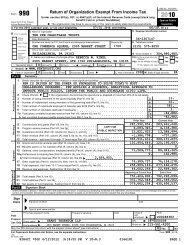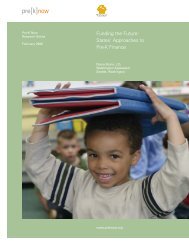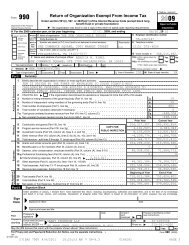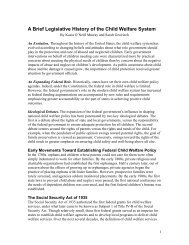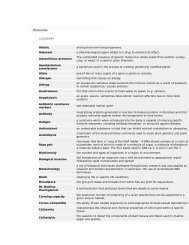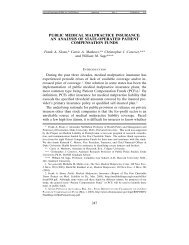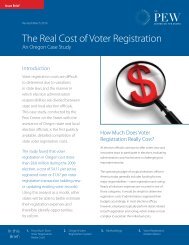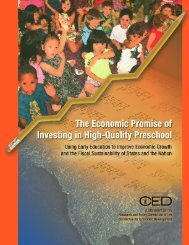PROSPECTUS - The Pew Charitable Trusts
PROSPECTUS - The Pew Charitable Trusts
PROSPECTUS - The Pew Charitable Trusts
You also want an ePaper? Increase the reach of your titles
YUMPU automatically turns print PDFs into web optimized ePapers that Google loves.
<strong>Pew</strong> Prospectus 2009<br />
IMPROVING PUBLIC POLICY<br />
<strong>Pew</strong> Center on the States<br />
11<br />
A voter in Ohio filling out a provisional<br />
ballot in November 2008.<br />
High-quality prekindergarten, a way to prepare children<br />
for success later in school as well as in life.<br />
seas voters still must find their way<br />
through a complicated and time-consuming<br />
patchwork of state and local<br />
regulations, a problem that will be an<br />
important focus for <strong>Pew</strong> this year.<br />
Helping states respond to extraordinary<br />
fiscal stresses and learn from<br />
each other’s best practices is also<br />
a core component of the work<br />
of the <strong>Pew</strong> Center on the States.<br />
Stateline.org, our online state policy<br />
news site, reports on daily developments<br />
by state governments;<br />
Trends to Watch, also online, tracks<br />
long-term economic trends and<br />
other topics across all 50 states; and<br />
upcoming center reports will provide<br />
more in-depth analysis of financial<br />
issues affecting the states, ranging<br />
from their pension fund liabilities to<br />
the potential benefit of investments<br />
in the green economy.<br />
Faced with a $200-billion budget<br />
deficit over the next two years, state<br />
policy makers are proposing painful<br />
cuts in human capital programs,<br />
including prekindergarten, which are<br />
essential to develop the nation’s workforce<br />
and ensure long-term economic<br />
success. For the past three years,<br />
<strong>Pew</strong> has been working intensively<br />
in one sector—corrections—where<br />
states can spend less and improve<br />
outcomes. <strong>The</strong> national price tag for<br />
corrections is now over $50 billion a<br />
year, but the country is not getting<br />
an adequate return on this investment.<br />
With recidivism rates at nearly<br />
the same level of 20 years ago, when<br />
states spent far less on incarceration,<br />
it is time to focus on more cost-effective<br />
alternatives. <strong>Pew</strong> is assisting several<br />
states, including Texas, Kansas,<br />
Pennsylvania and Arizona—states<br />
led by Republicans and Democrats<br />
alike—in taking a hard look at who<br />
is going to prison and how long they<br />
are staying, and identifying those who<br />
can be safely supervised in the community<br />
at far lower cost.<br />
In recent years, states have made<br />
significant gains funding programs,<br />
such as high-quality early education,<br />
that have been proven to deliver<br />
vital, long-term social and economic<br />
results. As they navigate the current<br />
economic turbulence, the <strong>Pew</strong> Center<br />
on the States is committed to providing<br />
the guidance that will help states<br />
make wise budget choices—cutting<br />
unnecessary spending while creating<br />
and preserving programs critical to<br />
our nation’s future.<br />
Susan K. Urahn<br />
Managing Director<br />
<strong>Pew</strong> Center on the States


